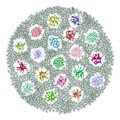The debate about free will is something of an old chestnut. And so here is my position in a nutshell. (Previously posted on the eugene mailing list.)
My best guess is that behavior bubbles up from pre-conscious neural processes. Consciousness is mostly an observer of behavior already well on its way. But it doesn't feel that way. That's perhaps because observing our own observing would lead to an impossible infinite regress. So when we feel our own behaviors they feel uncaused. And that creates the inner sense of free will.
At the same time...
We are each individually a jumble of incredibly complex cross-connected chaotic processes. This makes our behavior, beyond a
certain point, fundamentally unpredictable. Our own feeling of free will, combined with the observed unpredictability of others, leads us to posit free will in others as well. And others are happy to agree.
Consciousness as the first person experience of qualia is a whole other matter. A much larger mystery, in my book, than free will.
Wednesday, September 24, 2008
Subscribe to:
Post Comments (Atom)

No comments:
Post a Comment